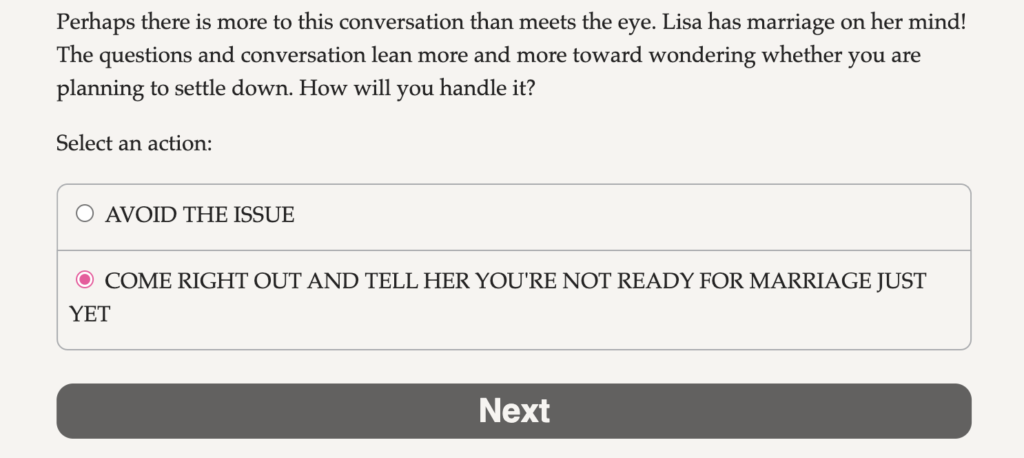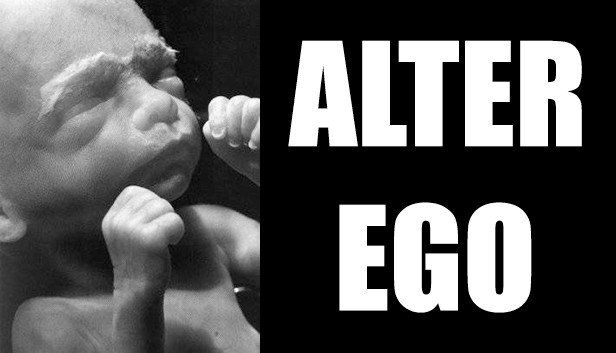As an avid simulation-lover, for my game review I tried to look for interesting sims that could get me as close to the Sims as possible. Although not quite the same considering it’s a largely text-based game, I landed on Alter Ego, a life simulator where your in-game character starts from (pre?)infancy and ends at death, whenever that may be. This game was developed and published by Activision in 1986 and I played the online version of it which can be found at playalterego.com. Even by just looking at the Wikipedia page for the game, there is an emphasis on the difference in gameplay between the female route and the male route. Keeping in mind the context of the 1980s, I will take a closer look at the way that Alter Ego helps define gender (albeit debatably) through gendered experiences – primarily demonstrated by the game’s mechanics and text scenarios that the player goes through.
I approached this game with the intent of living out to old age so I purposely avoided making “dumb” decisions like being curious about a liquid in the pantry as a child that would have most-likely lead to my death poisoning. This means I took less adventurous or dangerous decisions when it came to saying whether I was depressed in the game or if I wanted to fight a school bully that was much stronger than I was. I played through Alter Ego twice, once as a female and once as a male. Having played through both routes, I can directly compare both experiences and how the game treats both genders differently.

As I identify as a female, I went down this route first. Immediately I noticed that I could not go 5 turns without my gender being mentioned or coming up I some way. I was constantly reminded that I was, in fact, female. Between life stages, the narrator gives a short monologue about how your life was in the previous stage and what is to come in the next stage, generally. Between the childhood stage and the young adult stage, the game says “You will be expected to ‘act like a lady’ and become helpful around the house. Sometimes you may become moody and teary without any reason at all.” It’s obvious to see that the stereotypical image of the woman is one of restraint and service with the occasional emotional outbreak. The second sentence can’t help but remind me of how the word “hysteria” originates from the Greek word for “uterus”: hystera. In both cases, there is an attachment of explosive emotions to the female body and mind while the male version of the game avoids the mention of emotion during this stage transition entirely. This suggests that strong emotions are for women – an inferior gender with negative connotations that often does not make sense. Emotions are not for men and they do not have to deal with such an irrational thing.

The woman, in Alter Ego, is also seen as superficial – dabbling in makeup and plastic surgery for the purpose of attainment of a relationship with a man, which is of value. There is a random event that is spawned where a relative from your father’s side of the family (an unnecessary detail that ties this situation to men) comments on the makeup the character is wearing makes them look cheap. To understand how this relates to relationships, we must understand what the word “cheap” here means. When cheap is used to describe a woman, it is usually referring to sex work. For a woman to look cheap means that they sex with that woman could be bought for a low price. This scenario equates a certain type of makeup style with being a sex worker – a cheap one at that. All of this adds negative connotations to the scenario, alluding that the character looks “cheap” enough to be bought and is worth little value. Yet, as we know more now than before, makeup is a form of expression and can be used for many reasons. I personally use makeup to look nicer for myself, not for anyone else. Makeup, or any other action, does not directly lead back to the man but this game reinforces this male-gaze-centric idea of the woman by tying irrelevant things, like makeup, back to men by saying that it makes her look “cheap.” The woman has much more depth, inspiration, desire, and personality than to simply put on makeup for the sake of attracting a man or making others pleased by her appearance – much to the surprise of this game.

During my play-through as a man, a dating situation spawned where my girlfriend was asking me about marriage and my intentions for dating her. As I am a more serious person when it comes to dating, I dated with the intention of marriage in the game. However, the responses only let me respond to her with uncertainty or by telling her that I wasn’t serious about our relationship. By limiting my responses, Alter Ego has already told me what kind of a boyfriend and person I was: one who does not date with serious intentions and, if I avoid choosing that option, one who is vague and not transparent in relationships. This paints the picture of men to be more promiscuous and non-committal than women, who, represented by my girlfriend, are very serious and forward-thinking.

In the end, Alter Ego doesn’t seem to paint a very fair picture for neither man nor woman – both are drawn as stereotypes that negatively represent both genders. While the play-through as a man paints men as non-committal, you are constantly reminded that you are woman in the alternate play-through. Facing misogynist comments, like your father telling you that women don’t need to go to college anyways, and other gross interactions ultimately turn you into a superficial woman that can never shed “woman” from your actual identity as a person with other traits in this game. The exploration of gender in this game is actually the exploration of the boundaries that this game places on gender and feels quite disappointing as I go through the game. It feels like I’m talking to some 80-year-old telling me about how a woman should behave. The date of the game’s publication – 1986 – really shows in how it allows the player to express gender and play through as their selected gender.
P.S. Do not recommend this game for people who experience gender dysphoria in ANY way :((

